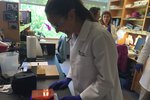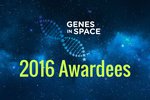Student Teams Selected as Finalists for International Space Station Science Competition
This post originally appeared on PR Newswire on May 18th
Student Teams Selected as Finalists for International Space Station Science Competition
Winning Genes in Space experiment to be performed aboard ISS
May 18, 2016, Cambridge, Massachusetts – Genes in SpaceTM announced five finalists in the second annual U.S. competition, in which students were invited to design an experiment using DNA analysis to solve a real-life space exploration problem.
Finalist proposals include investigations to study radiation damage, engineer biological solutions, and assess the impacts of microgravity on human physiology. The winning experiment will be performed aboard the International Space Station (ISS).
Genes in SpaceTM aims to inspire collaboration among students (grade 7–12) and scientists, and expose students to career opportunities in science, technology, engineering and mathematics.
The five finalist teams will receive mentoring from Harvard University scientists and the Massachusetts Institute of Technology to make the experiments feasible for space research. The teams will present their proposals to a panel of scientists, educators, and technologists at the 2016 ISS Research and Development Conference in San Diego, Calif., July 12-14. The winner will be announced at the conclusion of the conference. Members of the winning team will participate in a space biology workshop to prepare their investigation and be invited to watch the launch of their experiment from Kennedy Space Center in Florida.
The first Genes in SpaceTM experiment by 17-year-old high-school student Anna-Sophia Boguraev of Bedford, N.Y., was performed aboard the ISS on April 19 – making it the first DNA amplification experiment ever conducted aboard the ISS.
"The only thing that could better the feeling of watching my experiment launch to space is knowing that, in a few short days, I will be able to analyze the results, becoming a full part of humanity's journey to the stars," said Boguraev. Results from her Polymerase Chain Reaction (PCR) experiment in space will also be presented at the ISS Research and Development Conference in July.
The finalist teams were chosen from a competitive group of more than 380 applications from across the country. The finalists, with their ages listed in parentheses, include:
Amy Gu (17) and Maria Byamana (17) from Cambridge, Mass., aim to study the mechanisms that cause reactivation of Epstein-Barr viruses (EBV) during spaceflight to shed light on a process that could pose serious health threats to astronauts.
Dylan Barcelos (16), Kylie Cooper (16), and Mason Frizado (16) from Fall River, Mass., plan to investigate the genetic basis of increased bacterial virulence in microgravity, seeking to answer whether horizontal gene transfer could contribute to antibiotic resistance in bacterial biofilms that develop under space conditions.
Finsam Samson (15) from Troy, Mich., wants to develop a PCR-based assay to monitor oxidative stress on-orbit, ultimately looking to improve health conditions during long-term space travel.
Julian Rubinfien (15) from New York, NY, aims to establish a reliable assay for measuring telomere length in space, to investigate potentially deleterious effects of deep space flight on chromosomes that could lead to premature aging in astronauts.
Justin Harris (18), Savanna WeaselBear (17), Corey Ardrey (18), and Seth Bittle (18) from Ada, Okla., hope to study genetic changes across generations as natural selection operates in a space environment, and propose solutions that might enable future space colonization.
All finalist proposals make use of miniPCR™ technology aboard the ISS. PCR is a method for making copies of a particular sequence of DNA to conduct experiments on that sequence.
The Genes in SpaceTM competition is supported by its partners Boeing, miniPCR, the Center for the Advancement of Science in Space (CASIS), New England Biolabs (NEB), and Math for America (MƒA).
For more information about the Genes in SpaceTM competition, finalists, and the honorable mentions, visit: www.genesinspace.org.
# # #
Contacts:
Boeing: Kenneth Ulmer, kenneth.ulmer@boeing.com, 281-226-4872
miniPCR: Mugdha Narasimhan, genesinspace@minipcr.com, 781-990-8727
CASIS: Patrick O’Neill, poneill@iss-casis.org, 321-480-1054
New England Biolabs: Deana Martin, Ph. D., martin@neb.com, 978-380-7464
Math for America: Sarah Rooney, srooney@mathforamerica.org, 646-437-0921


